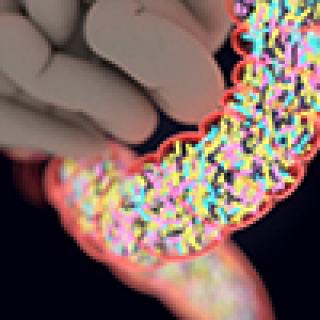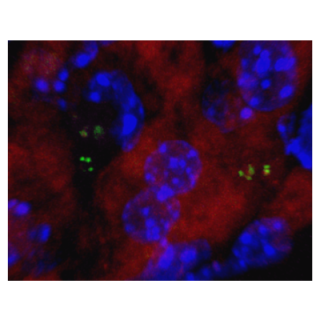News and Events
Celebrating CCR Careers: Alan Rein, Ph.D.
Alan Rein, Ph.D., is a known expert in the field of viral assembly, particularly in retroviruses like the human immunodeficiency virus (HIV). After an extensive career studying molecular mechanisms of retroviral replication and pathogenesis, he has announced his retirement.
Read MoreFecal microbiota transplants help patients with advanced melanoma respond to immunotherapy
A collaborative study between the National Cancer Institute (NCI) and the UPMC Hillman Cancer Center at the University of Pittsburgh suggests that fecal microbiota transplants can help patients with advanced melanoma respond to immunotherapy. “Our study is one of the first to demonstrate in patients that altering the composition of the gut microbiome can improve the response to immunotherapy,” says study co-leader Giorgio Trinchieri, M.D., Chief of CCR’s Laboratory of Integrative Cancer Immunology.
Read MoreNew way to address chemoresistance linked to the protein SLFN11
CCR researchers have discovered two complementary roles for the protein Schlafen-11 (SLFN11) in determining patient response to chemotherapy. These findings have implications for how to overcome this resistance and provide new treatment options for patients with small cell lung cancer (SCLC) and many other cancers.
Read MoreGenetics, not just smoking, influence small cell lung cancer risk
People with mutations in DNA repair genes may be more likely than others to develop small cell lung cancer. Identifying these mutations in patients could help guide treatment decisions.
Read MoreNew findings show how damaged cells survive the cell cycle
As cells divide and replicate, important safety checkpoints are in place to ensure that most faulty cells with damaged DNA do not survive the cell cycle. In a new twist, CCR researchers discovered how some damaged cells use molecular inertia to drive past these safety checkpoints and continue through the cell cycle.
Read MoreNew insights into what fuels an aggressive form of kidney disease
Researchers have uncovered a key mechanism behind an aggressive form of kidney cancer, whereby cells lacking an important enzyme are unable to replicate and maintain healthy mitochondrial DNA. This results in more genetic abnormalities in the cells, fueling the growth and spread of cancer.
Read MoreClinical trial studies therapy for relapsed/refractory T-cell malignancies
Milos Miljkovic, M.D., M.Sc., Assistant Research Physician in the Lymphoid Malignancies Branch, is leading a study of a 4-drug combination treatment strategy using romidepsin, oral 5-azacitidine, dexamethasone and lenalidomide for T-cell malignancies (TCMs). Researchers are seeking to determine the safety, side effects, and best dose of this 4-drug combination for people with relapsed/refractory TCM.
Read MoreStudy evaluates, treats, and follows patients with gastrointestinal stromal tumors
More than half of all gastrointestinal stromal tumors (GISTs) start in the stomach, but they can start anywhere in the GI tract. Andrew M. Blakely, M.D., Assistant Research Physician in the Surgical Oncology Program, is leading a study of GIST that could benefit current and future patients.
Read MoreNew clinical trial studies immunotherapy combination for metastatic breast cancer
Fatima Karzai, M.D., Associate Research Physician in the Genitourinary Malignancies Branch, is leading a study in adults with breast cancer that has spread to other places in the body. Researchers want to see if a combination of four drugs, which includes immunotherapy, can shrink the tumors of metastatic breast cancer.
Read MoreClinical trial studies therapy for adults with BRAF-mutant hairy cell leukemia
Adults with BRAF-mutant hairy cell leukemia, that did not respond to or came back after treatment, may be eligible to participate in a clinical trial at the NIH Clinical Center. Researchers want to see if combining encorafenib and binimetinib has an improved response rate than other drugs previously used to treat HCL.
Read MoreNew connection between gut microbes and liver cancer uncovered in mice
Researchers have uncovered a mechanism by which gut microbes can influence the immune response against nearby liver tumors in mice. The new findings could potentially explain why some people with liver or gut diseases, such as primary sclerosing cholangitis and colitis, tend to be more susceptible to cholangiocarcinoma.
Read More









